1 John 2:18-21; Psalm 95(96):1-2,11-13; John 1:1-18
There was a time when the prologue of the Gospel of St John was read at the end of every mass. This was because it sums up the entire work of redemption, starting with the creation by the power of the word of God, through to the completion of that work in the grace and truth of Jesus Christ. At the mid point of the prologue, is the incarnation, the birth of Christ as a human person like us. It is a masterpiece of balanced, inspiring creative writing with surely no equal elsewhere.
Mark begins his Gospel with the baptism of Jesus - the hinge point at which the old testament is fulfilled by the new, showing a devout jewish community that all they believed in now makes sense as it reaches fulfilment. Luke and Mathew add the infancy narratives with their differences designed for the separate audiences, Jewish and Gentile, that they were writing for. John however goes beyond time and history inviting us to ponder on the mystery of Christ who both was the means of creation as the word of God commanded all into being, and the completion as the word made flesh, that dwelt amongst us.
There may be times when we need to feel comforted by a long term stability in our relationship with God - read Mark and Matthew. There may be times when we want to bring the good news into the western society we live in - read Luke. But when we want to ponder and wrestle with the question about who or what God is, and why all the history happened, then John may provide if not the answers, a way of looking at our unbelief.

